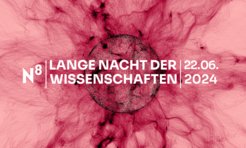Long Night of the Sciences 2024
Behind the scenes at the Max Planck Institute for Infection Biology
The Long Night of Science will take place in Berlin on 22 June. The Max Planck Institute for Infection Biology opens its doors to visitors for the "smartest night of the year". Experience our research through lab tours, experimental stations and talks.

The countdown to the Long Night of Science has begun: on Saturday, 22 June, those thirsty for knowledge can be inspired by spectacular experiments, exciting talks, science shows and guided tours in Berlin and Potsdam. The Max Planck Institute for Infection Biology will be there—you can find our varied programme here and on the LNDW website. The program is mainly in German, but English speakers are on hand at our information stands.
Our Institute is located in the same building as the Deutschen-Rheuma-Forschungszentrum (DRFZ) and the Max Planck Unit for the Science of Pathogens (MPUSP). Both institutes are also participating in the LNDW with many guided tours, booths and lectures.
Tickets for the Long Night of Science are available here or at the box offices.
Our Program
The highlight of the evening is our Science Slam, in cooperation with the German Rheumatism Research Center. You, the audience, can decide who will hold the coveted trophy for the best science slam in their hands at the end. It's time to find out which institute put on the best show. Clear the stage!
Anyone thinking about becoming a researcher is in the right place at our panel discussion and Q&A session "How to become a scientist". Scientists and employees from three biological institutes will talk about their career paths - whether direct or with detours. Our experts will answer your questions about paths into science and the requirements for starting a career as a researcher.
This year, we are once again offering our "Discover science" hands-on stand for young scientists. Children aged six to twelve can learn about bacteria, cells and our immune system through games and art.
Mosquitoes in the middle of Berlin? At the Max Planck Institute for Infection Biology, scientists are researching the infectious disease malaria. Take the guided tour "The tropical laboratory life of mosquitoes" to see how our malaria researchers keep mosquitoes. Further information about malaria and hands-on games are available at our information stand "Malaria explained".
We are also opening the doors to our zebrafish facility: on the guided tour "Tuberculosis research with zebrafish", you can find out how the small fish is used to research the lung disease tuberculosis. You can get to know the technical side of our research on the "Zoom-In" tour through our microscopy laboratory - from fluorescence microscopy to scanning and transmission electron microscopy and live cell imaging.
At the lecture by our research group leader Simone Reber, you can get to know another inhabitant of our institute: the clawed frog Xenopus. With the help of the clawed frog, also known as the apothecary frog, Simone Reber's team is researching the fundamental biophysical properties of the cell.
In addition to mosquitoes, zebrafish and clawed frogs, our researchers also work with a well-known pest from the kitchen: the fruit fly Drosophila melanogaster. On the guided tour "What does the fruit fly do in the lab" you can experience how the small flies are worked with in the lab.
About the Long Night of the Sciences Berlin | Potsdam
The Long Night of Science (LNDW) Berlin and Potsdam has been held annually since 2001. Between 5 pm and midnight, visitors can look forward to more than 1,000 program points. The Long Night of the Sciences is largely organized and financed by the participating scientific institutions. It is also supported by numerous partners.
